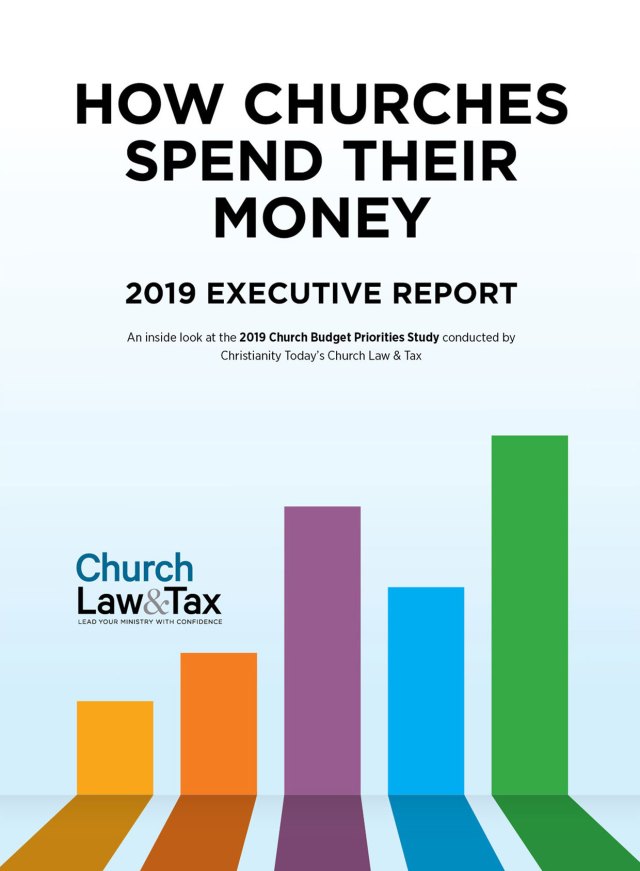Most people who work for a church do so out of a sense of calling: They want to serve Jesus, their fellow believers, and their neighbors.
But they still have to eat, as David A. Miller of the Slingshot Group points out. And they’ve got bills to pay.
Over the past decade, Miller has helped more than 200 youth pastors find work at churches. His advice for them: Ask about the money early on. Few things are deal-breakers for job candidates, he says. Money is one of them.
“If you know that you need to make $50,000 but the church only wants to pay $35,000—that’s not going to work,” he says. “A church is not going to jump that much.”
Pastors and other job candidates are often uncomfortable starting the conversation about compensation. That puts them in a difficult position, says Miller. As a potential solution, he often suggests churches put a compensation range in their job descriptions and advertisements. That’s a big help.
But pastors and other church workers also need to push past feelings of guilt when discussing money. There’s no shame in trying to take care of your family, says Miller.
“It’s gross to think you are going to get rich in ministry,” he says. “It’s not gross to know what you need.”
He advises that a job candidate at a church should ask about the pay range early on. That way they don’t get too far down the road with a church, only to back out.
Dave Fletcher—executive pastor at First Evangelical Free Church in Fullerton, California—agrees. He suggests that candidates ask about the salary/compensation range after the first interview.
“Let’s make sure we are in the same ballpark,” he says.
Think through what you need
Mike Waddy, pastor of First Baptist Maury City—a small town in west Tennessee—has eight kids. So he’s got to be careful when thinking about compensation. It’s not that he deserves more pay due to his higher bills. (In fact, churches that pay based on individual need instead of the value of the role are violating the law.) But a lot of people depend on him, and he’ll need to make sure the role’s compensation is adequate for his needs.
He’s been a pastor at two churches over the past 14 years. He’s also talked with two other churches about possible calls that didn’t pan out.
Waddy suggests that pastors or other church staff members go into an interview with a church knowing what they need to make and being up front about it. That simplifies the negotiating process—at least in the beginning.
“You don’t want to come across as saying, ‘I am in this for the money,’” he says. “But you know what you need to pay your bills.”
Those questions are vital, because money is one of the major stressors for the families of pastors, according to LifeWay Research.
A 2017 survey of the spouses of Protestant senior pastors found that more than one in three (36%) say they worry about making ends meet every month. Nearly half (46%) say they worry about not being able to save for the future. Perhaps most telling of all, the majority (61%) say the compensation paid by the church isn’t enough to support their family.
Do your homework
Taking a job at a new church can often mean moving , so it’s important to understand the cost of living in a new community, says Fletcher. Moving from a small town to a big city or across the country can come with sticker shock, due to the cost of living.
Fletcher’s advice? Ask a lot of questions in the interview process.
Among them:
- What does it cost to live in this community?
- How much are public school teachers (one possible comparison for church staff) paid?
- Does the church expect that the spouses of pastors and staff work?
- What are housing costs like?
- What are taxes like?
Having the right information can help a job candidate decide if a church is a good fit, says Fletcher.
Visit our sister-site ChurchSalary, for compensation guidelines based on education, experience, church income, church setting, and more.
For Greg Asimakoupoulos, a longtime pastor who now serves as chaplain at a retirement community outside of Seattle, understanding the cost of living in a new community was crucial.
He’s made five moves—including two cross-country moves—and had to negotiate compensation each time. For him, moving from the Chicago suburbs to the West Coast came with sticker shock.
“I was just grateful to have a position and a call,” he says. “I didn’t even look at the bottom line issues.”He’s also learned about negotiating the hard way. At his first church, there was no negotiating: He was single at the time and simply took what the church offered.
Every move to a new church became more complicated.
At his second church, Asimakoupoulos was married, and his wife was expecting. So he had to pay more attention to issues like the cost of living.
A friend gave him some advice early on that’s served him well over the long haul.
“Be sure that you ask for what you think you need right up front,” he says. “That’s the point in the conversation where you have the most leverage. Once you land at the church, you have lost some bargaining power.”
Understand the church’s financial health
Marty Duren, executive editor for LifeWay Pastor, says that pastors should ask about the church’s overall financial health when negotiating compensation. That includes asking about giving trends and whether or not the church has ever had financial difficulties (e.g., making payroll or excessive debt). Doing so can help a pastor determine whether the compensation they are negotiating is sustainable, says Duren, who is also a bivocational pastor.
“Knowing the giving trends of the church allows the candidate to determine whether the church can fulfill its financial commitment to the new employee,” Duren says.
Waddy agrees. “I have made the mistake of thinking that the church had the money today,” he says. “But they didn’t have the money two years later.”
Waddy also cautions pastors to be realistic in their requests. Sometimes a church—especially a congregation that’s been without a pastor for a while—will offer more than they can really afford, he says. It’s better to walk away than to take a job where the church can’t afford the compensation a pastor needs, or where the compensation eats up so much of the budget that there’s no money left for ministry.
“You want to make sure you are not messing with a church,” he says.
Try “Yes, and…” when negotiating salary
Things get tricky once the interview process concludes and there is an offer on the table. By this point in the process, the job candidate and the church have begun to build a relationship.
So taking a hard line when negotiating terms—especially about salary—can have consequences, says Miller.
If a pastor or potential church staffer turns down a job because of compensation, they can get a bad reputation.
“You give yourself a bad reputation when you turn them down for money,” he says.
In Miller’s experience, churches are becoming reluctant to negotiate when it comes to salary. Instead, he says, they often start with their best offer—or “what they consider the best offer.”
Asking for more money after the offer is made can have consequences down the road.
“Even if you get the money you are asking for, someone on that staff is not going to be happy with you,” he says.
Once a job candidate gets an offer, Miller suggests they take some time to think. Sometimes the offer is right on target. Other times, it may be low but acceptable. Still other times, it may be low and not acceptable.
If the offer is low, the candidate should ask, “Would I turn the job down if this is the final offer?” If the answer is yes, then make that clear, says Miller. If the answer is no, then a pastor can take the job, but still do some negotiating.
In the case of a low but acceptable offer, Miller suggests accepting the job, but with a caveat—asking if the salary can be adjusted.
“You are not saying, ‘It’s either make a better offer or I am not coming,’” he says. “You are letting them know what you need.”
If the offer is really low—say, $10,000 less than expected or hoped—it’s best to walk away. “They are not lowballing you $10,000,” Miller says.
Instead, the church most likely doesn’t have the budget for what your target was.
In that case, he says, just walk away. Don’t ask for more money. Even if you get it, it won’t be worth it. The church may eventually regret paying a pastor this additional amount—and it could poison the relationship from the start.
Ask for easy things
Negotiating for salary is difficult. For churches, the salary figure has the most emotional baggage, says Miller. But other benefits don’t have that baggage.
“The benefits are easier to negotiate,” Miller says—so ask for easy things, like more vacation days, time for a study break, funds for continuing education or conferences, or getting the church to pay for your work cellphone. And don’t forget to ask about retirement benefits.
Some of these benefits—especially vacation or other time off—don’t come with an out-of-pocket price tag, so a church is more likely to say yes to such benefits than they are to a larger salary, says Miller.
Sometimes the right benefits—or the right time of life—can make a lower salary workable.
That was the case for Asimakoupoulos when he left his role as a pastor and become a chaplain. At the time, his kids were out of college and his family had built up some equity in their home, so he knew he could live on less. The chaplain’s job offered good benefits, so he didn’t need to make as much.
“You have to be honest with yourself and the people you want to work with,” he says. “Maybe I don’t need to make as much at this point in my life.”
Duren also suggests that a pastor or church staffer ask about whether they can pursue speaking engagements or other work outside the church. Being able to do that may mark the difference between “can” and “can’t” for a pastor considering a church role.
If the pastor or church staffer has kids about to go to college or anticipates their family’s expenses will increase significantly in the future, outside income can be a big help—especially in a small church or congregation of limited means.
Being flexible about outside work can be a win-win, says Duren. But it’s important to discuss ahead of time.
“If the church’s compensation package cannot keep pace, the candidate should have freedom to pursue outside speaking or writing opportunities, or engage in an income-producing hobby, to make financial ends meet,” he says.
Don’t be afraid
On the other hand, don’t be afraid to ask for what you need, says Fletcher. Be brave and have the conversation if an offer is too low. The worst a church can do is not hire you. And it’s better to not take a job than to take a job and resent your new church from the start.
Remember the big picture: In any job negotiation at a church, a candidate wants to know, “If I work for those people, will they take care of me?”
If the answer is yes, then things will work out. If the answer is no, it’s better to walk away, says Fletcher.
“The best place to get fired is in the interview,” he says. “The worst place to get fired is as an angry new employee.”
Participate in the National Church Compensation Survey to provide churches with information they need to determine fair pay.







